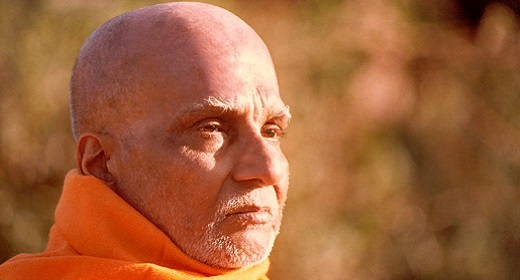by Dr. Steven Taylor: I was interested in interviewing Eckhart for my recent book Out of the Darkness, because he’s an example of a phenomenon which I have become more and more aware of in recent years…
the power of turmoil and stress to bring about a shift into enlightenment.
As readers of The Power of Now will be aware, until the age of 29 Eckhart lived in a state of anxiety and depression. As he described it to me when I interviewed him for my book, ‘There was a sense of great fear of life: fear of the future, fear of the meaninglessness underneath it all, but not wanting to fully face that meaninglessness and find out what underlies it.’
There were some external factors in Eckhart’s depression. One was his parents’ unhappy marriage, and the continual conflict between them. He had also been unhappy at school, where he felt like an outsider: ‘I didn’t fit in. I remember my closest friend at school had a severe physical handicap. Most people didn’t want to have anything to do with him. I was an outsider for inner reasons, and he was an outsider for physical reasons.’
Another external factor was Eckhart’s lack of social roots. After his parents separated when he was 13, he moved countries twice, first to Spain then to England. In England, he found that he could boost his sense of identity through intellectual pursuits. He did a degree at the University of London, worked hard and got a first, and went on to do post-graduate studies at Cambridge. But this success didn’t bring him any contentment: ‘The more I pursued my intellectual search, the stronger the sense of despair became…In every ego satisfaction there is always fear that it’s not enough. The more you present a facade to the outside world of confidence, the greater the unconscious fear grows. That’s why people need to play roles.’
This growing despair culminated in the transformation described in The Power of Now, when, on the brink of killing himself, Eckhart’s ego dissolved away, leaving him in a state of pure peace. He experienced not a break down, but a ‘shift up’ into a state of enlightenment.
Although he wasn’t completely aware of it at the time, one of the major psychological changes he underwent was that his mind became quiet; the ego’s incessant ‘thought-chatter’ had stopped. As he told me: ‘There were long periods in my daily life where there was no thinking. I was no longer identified with thought processes. Those compulsive automatic processes had subsided, the noisy mind which I had identified with, which had covered up the deeper dimension within me.’
Although he was very well read, Eckhart knew little about spiritual states or traditions, and so didn’t fully understand what had happened to him: ‘Being able to talk about it to others, to explain it to others, let alone help them – that came years later. A sudden awakening doesn’t mean a sudden understanding. I only knew I was at peace and I didn’t know why. But because I felt at peace, I felt very drawn to investigating spiritual teachings and schools and religions.’
It has now been more than 30 years since Eckhart’s transformation, and his awakened state has never faded, although there are sometimes fluctuations in its intensity: ‘Sometimes the underlying peace is just in the background; at other times it becomes so all-encompassing that it almost obliterates sense perceptions and thoughts and what one would usually consider one’s life. Even when things in the foreground might seem turbulent, in the background there is some sense of stillness and peace.’
Other Transformations
Although its intensity is perhaps unusual, the transformation Eckhart experienced is not uncommon. For Out of the Darkness, I spoke to 32 other people who went through a spiritual transformation after intense turmoil in their lives – people who were ill with cancer or ME, who reached ‘rock bottom’ through alcoholism, became severely disabled, or suffered from severe depression or intense stress. Like Eckhart, they all reached a point where they thought they were completely lost and broken, where they felt they had no choice but to give up and surrender to their predicament. And at the moment something shifted inside them. Suddenly they felt a sense of lightness and freedom. The world seemed a different place, with a new sense of meaning, harmony and beauty. And although the initial intensity of experience faded, the shift remained. They felt re-born, with a new identity. Years later – even decades – they were still filled with inner peace.
All of the ‘shifters’ – as I call them – were ordinary people with normal jobs and conventional lifestyles, who knew little or nothing about spirituality. As a result, it took some of them a long time to understand what had happened. Like Eckhart, they spent years slowly gravitating to spiritual books and teachers, gradually building up a framework to understand their new state.
Eckhart’s Uniqueness
But if the transformation Eckhart went through is not so uncommon, what is it that makes his teachings so influential and powerful?
On the surface of it, Eckhart’s books are not standard mind, body spirit fare. They’re not always consoling and positive – a large part of A New Earth, for example, is taken up with explaining what’s wrong with human beings, analysing the dark side of human nature and the dysfunctional workings of the ego. Eckhart’s books don’t tell us that we can get everything we want just by wishing in the right way, or that there are angels or extra-terrestrial entities looking after us. But this is also part of their power. They express a very pure and direct form of spirituality, uncluttered by unnecessary concepts. They get right down to the core, beneath all the distracting bright lights and colours.
His writing style helps with this too. Perhaps because his first language was German – a logical and concise language – his use of English is simple and direct. Every sentence is measured and stately, pared down to its essence.
Some spiritual teachers – Krishnamurti, for example – say that books can be a hindrance on the spiritual path. They fill the mind with unnecessary knowledge, inflate the ego with learning. And in any case, how can words convey the richness and fullness of spiritual experience? As the Zen saying goes, ‘The finger that points at the moon is not the moon.’ But this doesn’t seem to apply to Eckhart’s books. In some mysterious way, his words are the moon. He has the rare ability to transmit spirituality through the medium of words, so that it’s possible for the reader to gain a taste of enlightenment through reading his books.
Compared to many spiritual teachers, Eckhart is self-effacing. Some spiritual authors and teachers seem to crave attention and power. But perhaps because he became a spiritual teacher almost by accident – simply because people were drawn to his peaceful presence – Eckhart doesn’t need disciples. He seems quite happy to be no one. Although he knows that something profound happened to him, he doesn’t see himself as a special person. As he told me, ‘Occasionally it happens that people want to make you into something special. This is a pitfall for anyone who becomes a spiritual teacher. I always point that what I term presence comes through me, not from me, and that it’s also in them, otherwise they wouldn’t even notice it. It’s not my presence or your presence.’
In my view, this integrity lends a great deal of power and authenticity to Eckhart’s teachings.
It’s also significant that Eckhart was an intellectual before his transformation. Intellect and spirituality are sometimes seen as opposites, but they need each other. Intellect without spirituality is cold and narrow, but spirituality without intellect is dangerous too, often leading to a mush of irrational wish fulfilment. The state of enlightenment, and the path that leads to it, is unknown territory for most of us. We need explorers to map that territory, guides to show us the way there, to point out difficulties along the way, show us the signs of progress and help us distinguish the false from the true. And because of his sharp intellect, Eckhart does this better than anyone. He’s really a ‘spiritual psychologist’, offering an acute analysis of the insanity of the human mind, identifying its causes and showing us how to transcend it.
And if, as my research for Out of the Darkness suggests, the kind of ‘suffering-induced transformation’ which Eckhart went through is becoming more common, over the next few years we’ll hopefully see other spiritual teachers emerge, with a similar power and integrity.








































